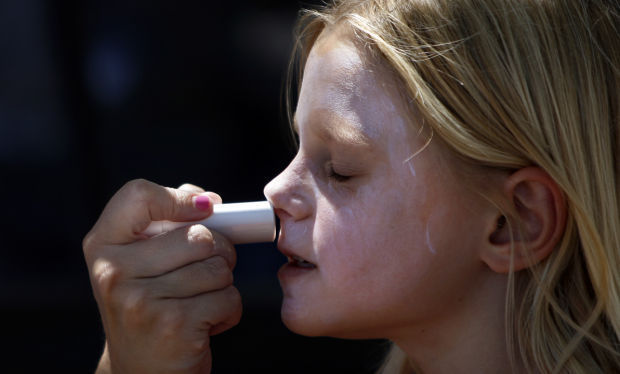Starting next school year, children will be allowed to bring and apply sunscreen at school or camp without a doctor's note, thanks to new Arizona legislation.
Like Tylenol or ibuprofen, sunscreen is classified as an over-the-counter drug by the U.S. Food and Drug Administration, and previously fell under medication bans that required a physician's note or a prescription for kids to have it at school.
The bill was introduced by Arizona Rep. Heather Carter, a Republican from North Phoenix, who also sponsored a bill to ban anyone under the age of 18 from using a tanning bed. The sunscreen bill was signed by Gov. Doug Ducey on April 26.

Rep. Heather Carter, R-Cave Creek
"Working with the Dermatological Association, both here and nationally, it has become more and more concerning that some schools were not allowing kids to carry sunscreen in school," said Carter. "The research is very clear that the earlier children have exposure to a dangerous sunburn, the more likely they are to have some of the most dangerous forms of skin cancer later in life and as we all know, kids are attending school during the day when the sun is at its greatest strength...So we created this legislation to allow parents and allow children to carry and apply sunscreen in school."
The legislature leaves room for schools to create their own policies surrounding the law.
For example, a school might decide children cannot use aerosol sunscreen or it may prefer children bring unscented varieties.
"We left the policy as broad as possible to allow kids to carry it with no question and to allow schools to create necessary policies for the legislation to work," Rep. Carter said.
Tucson Unified School District says it has always allowed students to apply sunscreen in the health office.
"This law allows children to apply their sunscreen in the classroom which is great news — no time wasted traveling to the health office and teachers can promote sun safety for the entire class," said Nikki Stefan, health services director for TUSD.
The law, HB 2134, allows school districts or camps to make their own policies or guidelines regarding teachers or volunteers assisting children with the application of sunscreen.
The Skin Cancer Institute at the University of Arizona says this new law is a step in the right direction.
"We need to protect our kids and we know if they take care of their skin when they're younger, they'll have less of a chance of developing skin cancer," said Denise Spartanos, community outreach coordinator for the Skin Cancer Institute.
Applying sunscreen in the morning before school isn't enough, Spartanos said.
"If a child is vigilant about putting it on at say 7 in the morning and the child is on the playground at 11 in the morning, it's not effective," Spartanos said. "We recommend putting it on every 90 minutes. Parents may feel a false sense of security not realizing they need to reapply."
The type of sunscreen used is just as important as applying it correctly, Spartanos said.
The Skin Cancer Institute recommends products that are broad spectrum, which protects from UVA and UVB rays; SPF factor of 30; and have a correct active ingredient which can be zinc oxide, titanium dioxide, avobenzone or mexoryl.
In response to the new legislation the Skin Cancer Institute will be reaching out to schools to inform them about its Protect Your Skin program which sells kits that includes a gallon of zinc-oxide-based, SPF 30 sunscreen with two dispensers and educational signage that can be purchased for $150.
"I've been working on skin cancer awareness and legislation to encourage healthy sun behaviors since I've been elected and this has been embraced by constituents, schools, physicians and advocacy groups from the start," Carter said. "I've tried to do a lot of things, but this one was common sense and people were excited. They were surprised we had to pass a law to do this, but they were glad we did."





